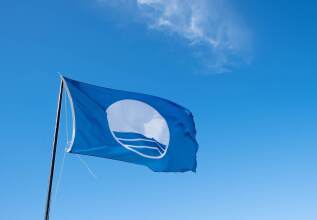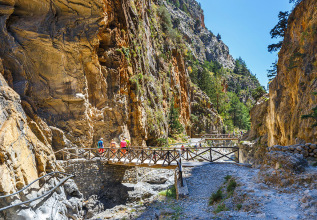4 MIN
VISIT GREECE
World Tourism Day 2022

Rethinking Greece’s major economic sector is not an easy task but the pandemic emphasized how critical it is to do so. We should all seize the opportunity to rethink how we do tourism by protecting nature, fostering inclusion and promoting cultural understanding. It’s all of our duty to rethink tourism and act upon it. As the quote says: take only memories, leave nothing but footprints.
Greece is a country with many a charm: its long and winding coastline, the numerous islands, and its Mediterranean climate can provide you with marvellous beaches to enjoy and sun to bask in. Its forests harbour a rich biodiversity. Greece has made great strides in sustainability, and some of its features that make it a hit with ecotourists are inherent in its culture. Explore the Greek mainland & islands that offer a greener, sustainable and closer-to-nature holiday experience.
Chalki Island is at the forefront of energy transition. ChalkiON is the first energy community to own and operate a solar park along with the local authority. The design of Chalki’s initiative covers the energy needs of the island. Based on data obtained from the electric bills of Chalki’s residents, the island proceeded with the installation of the 1MW solar park, thus making it the first energy autonomous island in Greece.
The town of Trikala, in the Thessaly region, is Greece’s first smart city. To reduce traffic, pollution and CO2 emissions, the city offers its citizens the Smarta 2 app, which allows users to request on-demand bus & taxi services. Green transport options include two driverless electric buses. The city also runs a smart system that uses sensors to inform the waste collection centre about waste levels in rubbish bins.
Astypalaia Island, in the SE part of the Aegean Sea, has adopted a sustainable approach in tourism. Chosen by the vehicle brand Volkswagen to establish a groundbreaking mobility system, the island has implemented a plan to transition to renewable power generation, mainly using power produced by wind and solar panels, and the operating electric vehicles, e-bikes and e-scooters.
Tilos Island only has few inhabitants but when tourist season arrives there is a peak in energy demand and the island’s supply was often not enough, resulting in frequent, prolonged blackouts affecting among other things refrigerators, which lead to food waste. The island was the first of 80 projects chosen to receive funding from the Horizon 2020 programme, which allowed the island to build a hybrid power station, with wind and solar farms, and batteries for storage. Tilos is now energy sufficient and has significantly reduced its carbon footprint, while bringing practical benefits and financial gain to both locals and tourists. The island is also a leader in recycling: Just Go Zero Tilos is a zero-waste programme, launched on the island, for recycling hazardous and non-hazardous material, with great success so far!
The bare and imposing landscape of Sikinos Island can be explored by hiking its trails, which were signposted and cleaned thanks to the project “Paths of Culture” by the ELLINIKI ETAIRIA - Society for the Environment and Cultural Heritage along with the Municipality.
Water scarcity is a serious issue on Sikinos Island, but in 2014, the Coca-Cola Community Water Partnership Programme helped the island integrate a rainwater harvesting programme, so water gets distributed to key locations around the island.
As part of the ecological ‘Sea Change’ programme in 2018, the island became the first Aegean island to ban plastic straws and replace them with reusable or biodegradable alternatives. Last but not least, nearly 70% of Sikinos Island is part of the Natura 2000 network of nature protection areas.


